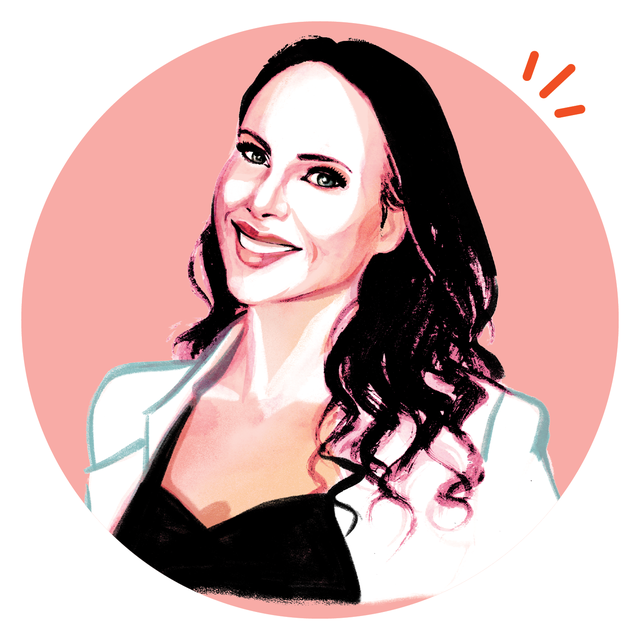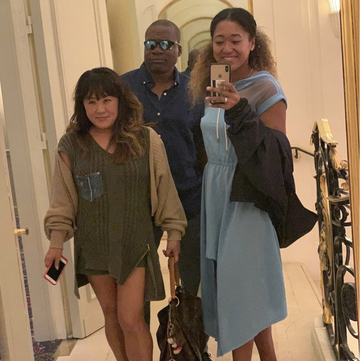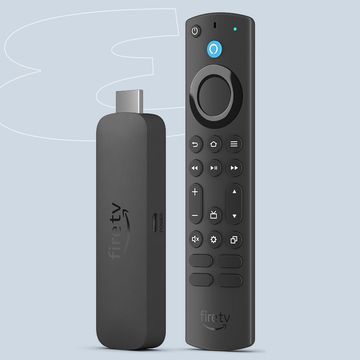The term self-care is having a moment—but is it the right one?
When it’s not being sold to us in the form of candles or fuzzy pajamas via Instagram ads, self-care is taking over our TikTok FYP with “everything shower” routines. It’s become something of an excuse for our every indulgence. Happy hour after a terrible day at work? That’s self-care. Brunch, followed by a Euphoria-inspired mani? Self-care, baby! Splurging on a luxurious tropical vacation after the hell we’ve been through these past two years? Self. Hyphen. Care.
But how much we seem to be focusing on self-care online doesn’t actually align with reality. More than half of women (54 percent) said their mental health is suffering from job-related burnout, one recent survey found. And stress and anxiety continue to be at an all-time high, with 42 percent of adults saying they’ve relied on unhealthy habits to get through the past few years, the American Psychological Association’s latest Stress in America poll reveals. For example, one in five polled said they’ve been drinking more during the pandemic.
Stats like these raise this question: If the “treat yourself” approach to self-care is working, why are we still so frazzled and worn out? Well, according to experts, we’re all somewhat missing the point. “Self-care is really about taking time to understand your true needs beyond your impulses,” says WH advisor Chloe Carmichael, PhD, a NYC-based therapist and the author of Nervous Energy: Harness the Power of Your Anxiety. “It’s about looking at yourself on a deeper level.”
It’s not that a vacation or a happy hour isn’t a worthy form of self-care. Sometimes “treating yourself” is what’s needed, says Dr. Carmichael. But the truth is, if that’s all you’re doing, you’re missing out on the true benefits. Keep reading for a step-by-step lesson in strengthening your relationship to caring for yourself.
Define What Self-Care Means to You
Real talk: There isn’t one single meaning of the term. It’s an ever-evolving concept that’s constantly updated, for better and for worse. “Self-care” as a cultural phenomenon was first introduced by feminist author Audre Lorde in her 1988 essay collection, A Burst of Light, says Omolara Thomas Uwemedimo, MD, MPH, an assistant professor at Northwell Health in New York. “For her, a Black, queer woman, self-care was about self-preservation. It was about being able to see your identity outside of the white gaze and come back to yourself. It wasn’t something nice to do, but something that kept you alive.”
Since then, self-care has been appropriated by marketing whizzes eager to sell an idealized version—and the overpriced candles that come with it. But now, finally, we’re starting to come full circle—and to build upon Lorde’s original thoughts, adds Catherine Cook-Cottone, PhD, a professor at the University of Buffalo, whose research focuses on mindful self-care. People recognize the holes in that commercialized alteration and are searching for a deeper understanding of what it can do. “Self-care isn’t something you buy,” Dr. Cook-Cottone says. “It’s an active practice of taking care of the internal aspects within the context of external pressures.”
How These 3 Women Learned To Practice Real Self-Care
According to Barbara Riegel, PhD, a University of Pennsylvania nursing professor who studies chronic illness, self-care is about “taking control of your body and taking control of what’s going on with you.” For Dr. Uwemedimo, self-care is “creating space in your life to remember who you are and what your purpose is.”
So, the semantics are up to you. Just remember that it’s a lot like parenting yourself, which means it’s your job to stay focused on what you need, not what you want in the moment. That’s not always easy. One example to drive the point home: Social connection is important, but maybe you just moved and don’t know anyone, so reaching out feels scary. You can tell yourself that staying home with Netflix is self-care (and it may make you feel good at first), but Netflix won’t fill your need. “Self-care is about taking an honest look at what you require in order to function your best—not only today, but in the broader sense,” Dr. Carmichael says.
Find Ways to Feed Your Mind, Body, And Soul
One of the most difficult aspects of self-care is that it’s so individual. “There isn’t a litmus test where certain behaviors always count as self-care,” Dr. Carmichael says. “It depends on the person.” So the questions remain: How do you know what you need? And how do you find that balance between pushing yourself outside your comfort zone and comforting yourself when you need it?
Remember the acronym ART to help you decipher if your self-care behavior is on point, suggests Dr. Cook-Cottone. A is “attunement.” As in, are you tuned in to what you really need? R stands for “responsive.” Is the behavior going to serve that need? And T is “taking action.” Will you follow through?
If you’re having trouble with the first part, you might start including time in your routine to do nothing but reflect. “Taking a break is important to develop awareness,” Dr. Cook-Cottone says. That *might* mean taking a regular bubble bath (you’re welcome), but while you’re in the water, ask yourself: What do I need to feel my best? What is working in my life right now—and what isn’t? If you’re short on time, you can accomplish the same goal by using the moments you spend on other activities—say, folding the laundry or working out—to focus on your breath and simply listen.
Instilling a time to pause in your day should give you an idea of what, if anything, is missing from your routine. It’s also good practice for knowing what you need in the moment. You might learn that you should focus more on physical forms of self-care: getting enough sleep, eating well, exercising, taking prescribed medications, etc. Or maybe managing stress is an area to work on, which eventually leads you to a mindfulness practice or more time outside in nature. Maybe you need to do something creative, or something that contributes to your community, like volunteering for a cause you care about.
Friendly reminder: As a complex being, you have complex needs. It’s not as if you can pick one self-care activity and call it a day. Think of it like diversifying your retirement portfolio. “You want a diverse portfolio of self-care,” says Dr. Cook-Cottone. Some activities will be for your physical well-being; others will be for your spiritual and social sides. From there, all you have to do is make sure to make time for that self-care on the regular.
So, yes, this means that you want to have structure, but also the leeway for spontaneity. Include small, daily practices like saying a loving thing to yourself while you brush your teeth, as well as formal practices like regular meditation. Scheduling a variety of activities—fitness classes, meet-ups with friends, whatever lights you up—can take some decision-making off the table. Creating lots of opportunities and practicing varied ways of providing care for yourself will help you “be more agile and responsive in the moment,” Dr. Cook-Cottone says. In other words, when a stressor comes up, it’ll be easier to dig into your toolbox and lean on a practice that’s already routine.
Set Boundaries In New Ways
This can have multiple applications—and implications. First, you want to set boundaries that protect your time for yourself, like saying no to a night out when what you really crave is a good sweat or some time to process a bad day with a friend. You also want to set boundaries for what you accept as appropriate for your life. That means setting rules for the types of treatment you tolerate in your relationships or at work. Note: This second type of boundary is generally harder to set, given how our culture rewards women for being able to push through anything.
The benefit is that when we set boundaries for ourselves, we’re protecting others too. We’re making it smoother for other women to set similar boundaries. “It’s easier to do that in community, so you don’t feel like the odd person out,” Dr. Uwemedimo says.
It’s all too simple to let self-care be last on our to-do list. But without it, you’ll lose yourself in the constant pressures—and who wants to live like that? Plus, self-care isn’t just a mental boon. If you ignore it, you’re setting yourself up for major health issues down the line, from burnout to true chronic illnesses like depression, diabetes, or heart disease, Dr. Riegel says. “It’s not something that can wait.” All the more reason to start putting yourself first.
Wondering how your self-care stacks up? Take the Mindful Self-Care Assessment, developed by Dr. Cook-Cottone, at surveygizmo.com/s3/5556058/mscs. After answering a series of questions, you’ll receive assessments of where you land compared with other respondents and the areas you can work on (like “mindful relaxation” or “physical care”).
This article originally appeared in the July/August issue of Women's Health, on newsstands now.

















